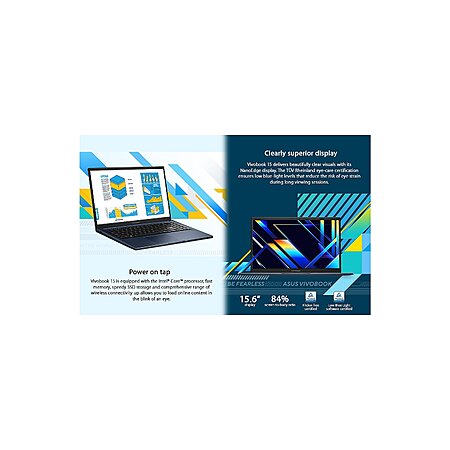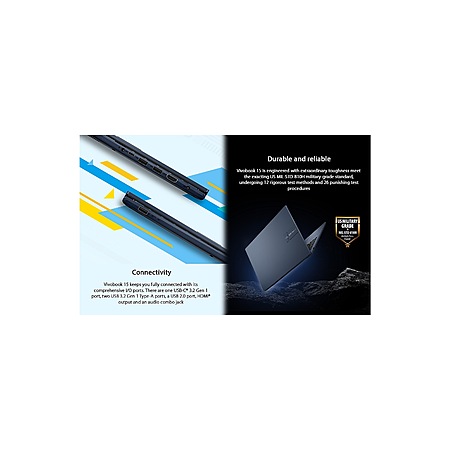This post can be edited by most users to provide up-to-date information about developments of this thread based on user responses, and user findings. Feel free to add, change or remove information shown here as it becomes available. This includes new coupons, rebates, ideas, thread summary, and similar items.
Once a Thread Wiki is added to a thread, "Create Wiki" button will disappear. If you would like to learn more about Thread Wiki feature, click here.
expiredNavy-Wife | Staff posted Nov 24, 2024 02:02 AM
Item 1 of 4
Item 1 of 4
expiredNavy-Wife | Staff posted Nov 24, 2024 02:02 AM
Asus Vivobook 15 Laptop: Intel Core 5 120U, 15.6" 1080p, 16GB RAM, 512GB SSD
+ Free Shipping$380
$600
36% offStaples
Visit StaplesGood Deal
Bad Deal
Save
Share




Leave a Comment
Top Comments
43 Comments
Sign up for a Slickdeals account to remove this ad.
Mediatek wifi is mixed too.
The Intel wifi is best quality that runs 24/7. Spec aren't everything.
https://www.asus.com/us/laptops/f.../techspec/
https://www.asus.com/us/laptops/f.../techspec/
Sign up for a Slickdeals account to remove this ad.
ASUS laptops (as far as we know, all of them) have a VERY high chance to heavily deterioriate their cooling potential between 8 months to 1 year from date of MANUFACTURE, with the problem not being fixable. The running theory by D2ultima (the admin who's seen this issue happening for over 10 years now) is that the heatsinks have the special gas inside them that's meant for rapid thermal transfer escape and be replaced with regular air, rendering the heatsinks themselves much worse than normal. If you RMA for this problem, you will get a new (unsold, unused) yet old (created months ago for this model) heatsink, or new/old unit of the same model which 9/10 times exhibits the same problem out the gate as soon as you get it back. Repasting doesn't help, nothing you can do helps, the units are just generally worse for the rest of your ownership.
Do be aware, this issue does NOT happen to every unit you could possibly buy. It is possible to get a unit that works perfectly fine and will last you easily 4+ years like a tank, but the chances of getting a good unit in this manner appear to be rather low. But the one time we recommended the units for a year we had a FLOOD of people come back complaining a year later, and many of our regulars and higher roles have or have had ASUS laptops with this same issue.
Finally, you might be asking, why doesn't anyone report on this, or why do they review well? The issue is that because this problem shows up after approximately 1 year, everyone has moved on. Why would a reviewer make an update in 2024 for a model reviewed in 2023? Everyone is buying the 2024 model now, it won't get them any views and if anything would just get them in trouble with ASUS themselves. So it never makes heavy media presence, but it is a very rampant problem.
In short, ASUS laptops are not recommended, and won't be until ASUS can fix this problem for at least 3 years in a row. Buy them at your own risk.
This is what ChatGPT returned when I asked about this issue:
Asus laptops, particularly gaming models, are known to experience a decline in cooling performance within 8 months to a year of use. This issue often stems from several factors:
Thermal Paste Degradation: Over time, the thermal paste applied during manufacturing can dry out or degrade, reducing heat transfer efficiency between the CPU/GPU and the heatsink. Many users report improvements after reapplying thermal paste or switching to higher-quality compounds
Dust and Clogging: Accumulated dust in fans and vents restricts airflow, causing higher operating temperatures. Regular cleaning of the cooling system can help mitigate this issue
Fan Wear: Fans can lose efficiency due to wear or improper lubrication, leading to reduced cooling potential
Design Constraints: Some models have been criticized for inadequate thermal designs that struggle to handle high heat loads consistently over time.
Modifications like undervolting or using external cooling pads have been suggested as workarounds
If you're considering an Asus laptop, these issues are not universal but tend to occur more often in performance-focused models like ROG or TUF series. Proactive maintenance (e.g., regular cleaning, thermal paste replacement) and potentially using additional cooling solutions can help maintain performance.
Asus laptops, particularly gaming models, are known to experience a decline in cooling performance within 8 months to a year of use. This issue often stems from several factors:
Thermal Paste Degradation: Over time, the thermal paste applied during manufacturing can dry out or degrade, reducing heat transfer efficiency between the CPU/GPU and the heatsink. Many users report improvements after reapplying thermal paste or switching to higher-quality compounds
Dust and Clogging: Accumulated dust in fans and vents restricts airflow, causing higher operating temperatures. Regular cleaning of the cooling system can help mitigate this issue
Fan Wear: Fans can lose efficiency due to wear or improper lubrication, leading to reduced cooling potential
Design Constraints: Some models have been criticized for inadequate thermal designs that struggle to handle high heat loads consistently over time.
Modifications like undervolting or using external cooling pads have been suggested as workarounds
If you're considering an Asus laptop, these issues are not universal but tend to occur more often in performance-focused models like ROG or TUF series. Proactive maintenance (e.g., regular cleaning, thermal paste replacement) and potentially using additional cooling solutions can help maintain performance.
Asus laptops, particularly gaming models, are known to experience a decline in cooling performance within 8 months to a year of use. This issue often stems from several factors:
Thermal Paste Degradation: Over time, the thermal paste applied during manufacturing can dry out or degrade, reducing heat transfer efficiency between the CPU/GPU and the heatsink. Many users report improvements after reapplying thermal paste or switching to higher-quality compounds
Dust and Clogging: Accumulated dust in fans and vents restricts airflow, causing higher operating temperatures. Regular cleaning of the cooling system can help mitigate this issue
Fan Wear: Fans can lose efficiency due to wear or improper lubrication, leading to reduced cooling potential
Design Constraints: Some models have been criticized for inadequate thermal designs that struggle to handle high heat loads consistently over time.
Modifications like undervolting or using external cooling pads have been suggested as workarounds
If you're considering an Asus laptop, these issues are not universal but tend to occur more often in performance-focused models like ROG or TUF series. Proactive maintenance (e.g., regular cleaning, thermal paste replacement) and potentially using additional cooling solutions can help maintain performance.
Regular laptops last 5x longers, overheat far less especially Ultra efficient chips under 25TPD.
Sign up for a Slickdeals account to remove this ad.
Leave a Comment